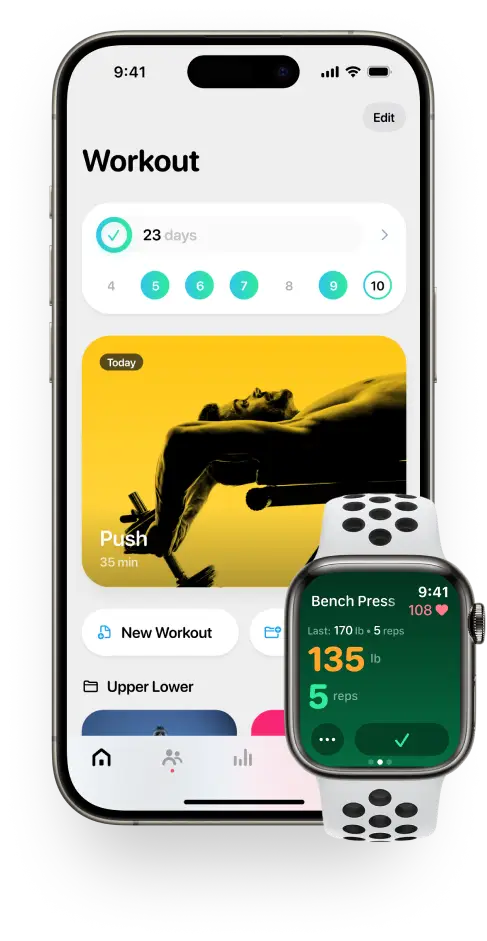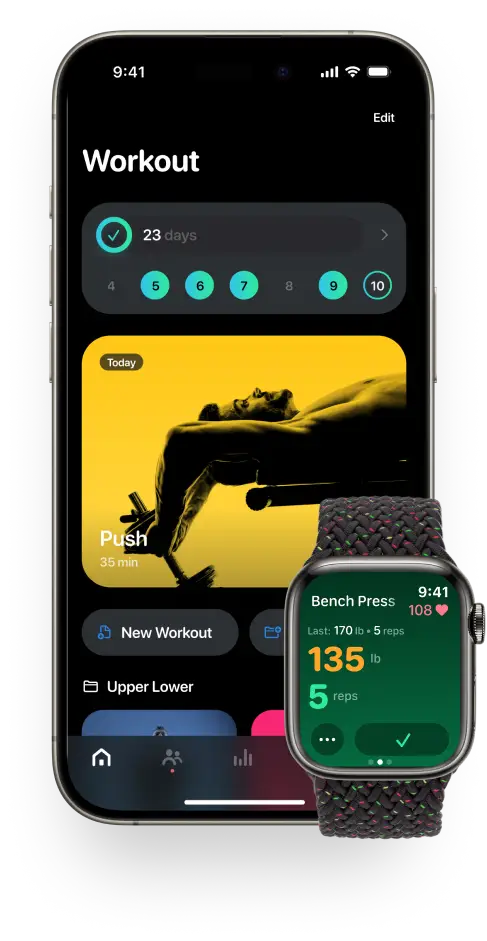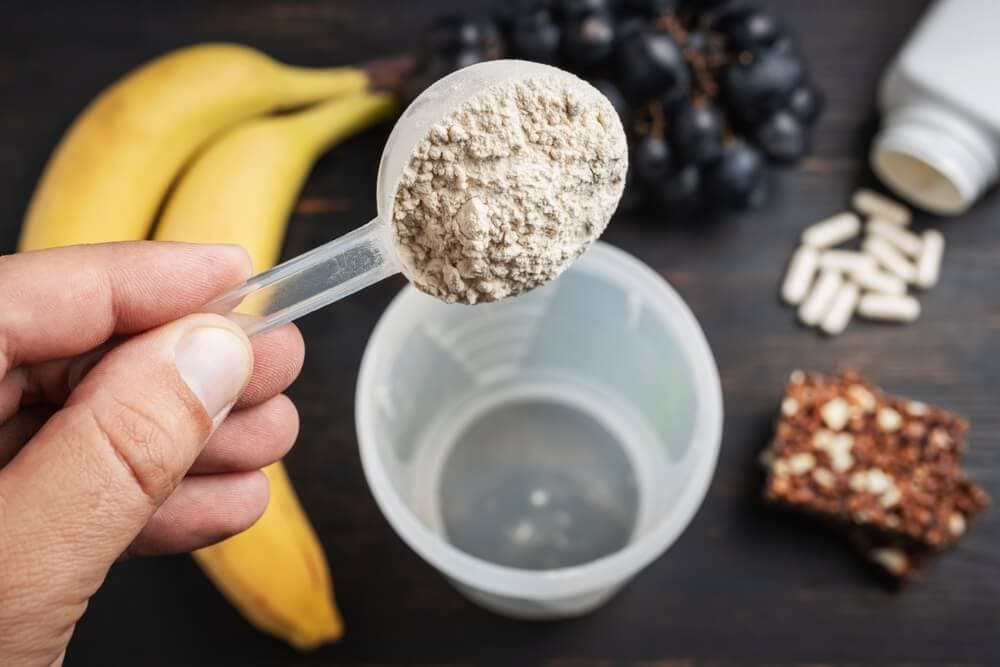How Many Scoops of Protein Powder? Learn to Measure Your Protein
Understand how to measure protein powder and learn how many scoops of protein powder you need.
How many scoops of protein powder should you take per day?
1-2 scoops of protein powder is the sweet spot for most people who want to supplement their workouts with extra protein.
You’ll usually find a guideline of two scoops listed on commercially available protein powders you can buy.
But is this number set in stone?
If you want to accelerate your muscle growth, it can be tempting to up your dosage. This article will look at what the guidelines are around protein powder consumption and whether you really need to stick to two scoops.
Plus, learn how protein affects your capacity to build muscle. Finally, should you skip the protein powder?
We’ll see who may not be a candidate for protein powder supplementation and what risks (or benefits!) it can pose to your health.
Is 2 scoops of protein powder too much?
Nope, it’s the ideal dose for most people.
How much protein powder you take depends on your personal fitness goals. A scoop of protein powder typically contains around 25g of protein.
Protein powder for muscle growth
If you’re looking to put on muscle, you may need more protein than the average person. This can come from powder or dietary sources.
You can get protein naturally from many foods that you probably eat every day. Good sources of lean protein include:
- Lean ground beef
- Chicken
- Salmon
- Nuts
- Tuna
- Tofu
- Eggs
- Beans

A rule of thumb for people looking to bulk up is to take in 1.2-2 grams of protein per kg of body weight.
So let’s say you weighed 150 lbs. Convert that number to kilograms and you’d get 68kg.
To gain muscle, you’d want to try and get in 81.6- 136 grams of protein daily. Remember, these are just guidelines. Your body is unique and may have higher or lower protein needs.
If we refer back to the “2 scoops rule,” at 25g of protein per scoop, you’d be consuming about 50g through your powders.
Protein powder shouldn’t be your only source of protein, though. The guidelines on supplementation assume that you get protein in through your diet too!
How much protein you need depends on several factors. These include:
- Activity level
- Body metabolism
- Daily calorie intake
- Nutrient deficiencies or dietary restrictions
What types of protein powder are there?

Now that you know the guidelines for how much protein to consume, what type of protein goes into protein powders anyway?
Protein powder refers to nutritional supplements that contain protein to help you with muscle repair and recovery. Protein is built from amino acids and helps with muscle and bone repair. It can help your body develop things like enzymes and hormones as well.
Protein powders are used as a type of athletic nutrition supplement, offered in several different types.
You can consume them as:
- Pancakes
- Protein overnight oats
- Protein shakes
- Smoothies
- Protein cookies
And more.

Read on to see the most common types of protein powder.
Whey Protein
This is the most common type of commercial protein. Derived from milk, whey protein is highly soluble in water. This makes it simple to use for athletes. Whey protein contains all 9 types of amino acids that your body needs to get from food. This makes it a complete protein.
These amino acids are:
- Leucine
- Histidine
- Methionine
- Isoleucine
- Lysine
- Tryptophan
- Phenylalanine
- Threonine
- Valine

Casein Protein
This is another milk-based protein powder, like whey. Casein, though, dissolves more slowly in your body. This can make it a good choice if you’re looking to take protein before bed.
(P.S., read Can I Take Creatine Before Bed to learn about some of the effects of pre-sleep supplements).
Pea Protein
This is the most digestible plant-based protein type, derived from yellow peas. If you are vegan this option closely mimics the effects of whey protein.
Hemp Protein
This protein powder, although high in omega-3s, has a lower protein content than other protein powder sources (around 10-15g per scoop, compared to 25g per scoop from most whey proteins). It’s a good idea to pair this with another protein source if you are looking for a complete amino acid dose.
How do you measure protein powder?
Use the scoop included with your container of protein.
If you lose your scoop, check your tub for the appropriate amount listed in grams. Use a food scale and scoop the proper amount into a container on your scale until you match the gram weight.
You can also convert the amount in grams to tablespoons (1 tbsp is approximately 15g) and use simple kitchen measuring spoons.
Protein powder risks and benefits

In research on the effects of protein supplementation on performance and recovery, there’s good evidence to show that protein powder helps with muscle synthesis. Here’s an overview of several other things it can do.
Benefits
- Helps you hit daily protein targets
- Helps you build muscle
- Helps with tissue repair
- May lower blood pressure
Risks
- Some powders have sneaky added calories, sugar, and additives
- Some powders may contain heavy metals
- May cause acne
- May cause nausea
- May cause bloating
- Potential allergies to additives
- Potential adverse effects on kidney and liver function
Learn more about your risk factors by reading this article: Efficacy and safety assessment of protein supplement.
Is it okay to take 3 scoops of protein a day?
For most people, 2 scoops will do just fine.
That said, high-level athletes or people who are extremely active may need more protein and be able to consume higher amounts of protein powder safely.
If you want to consume more protein than the recommended amount, talk to a sports dietitian or other professional to learn the impact.
It’s a good idea to spread out the time between each scoop of protein for efficient absorption. You’ll want to be taking the highest quality protein powder too, if you consume more than usual. Understanding how protein powder is made is a good idea if you want to up your dose to three scoops.
How many scoops of protein powder a day for beginners?
1-2 Scoops
If you’re totally new to protein powder, start with one scoop of protein powder.
You can bring the dose up to the recommended two scoops once your body gets used to a protein supplement.
What happens if you take too much protein powder?
If you overdo it on the protein powder, you may find yourself feeling:
- Sluggish
- Tired
- Nauseous
- Dehydrated
- Sick to your stomach
And more.
It’s a good idea to always stick to the recommended amount. If you notice any of these symptoms cropping up, try scaling your protein scoops back.
You may even want to cut back to one scoop from two if you’re finding you still notice negative side effects at the recommended dose.
How many scoops of protein powder for weight loss?
1-2 Scoops
To lose weight, stick to a low to medium dose of protein powder, unless you are also increasing the amount that you work out.
Whey protein typically doesn’t taste very good plain. To remedy this, you’ll usually find that many powders on the market are flavored.
Yes, this makes them taste better.
But flavors and additives can add a lot of extra calories to your protein.
How many calories are in protein powder?
Powders will usually run between 100-150 calories per scoop.
At the recommended daily dose of two scoops, this can add a 200-300 calorie surplus to your total calorie intake.
Keep in mind that most people take their protein in smoothies, shakes or even pancakes too. All of these meals and snacks are calorie-dense. If you’re supplementing, this is a key concern when it comes to losing weight with protein powder.
How many scoops of protein powder to gain muscle?
2 Scoops
To bulk up, you typically need more protein and more calories than you consume for maintenance.
Two scoops of protein puts you within the healthy recommended range while also adding the protein you’ll need for a lean bulk.
How many scoops of protein powder after a workout?
1 Scoop
It may be effective for you to space out the times that you take your protein.
On the day of a workout, try taking one scoop of protein powder directly after your workout and another either before bed or in the morning, depending on when you feel you need it.
Protein can help you feel more full after your meals and help tide you over. If you notice that you tend to overeat at certain times of the day, try spacing your protein intake out.
If you use a scoop of protein instead of greasy snacks that might make you dirty bulk you may help prevent yourself from overindulging in too many snacks that detract from your fitness goals.
Scoop up the best workout app on the market. The Flex App progresses as you do with plate tracking capabilities and auto progression.
For more information on supplements, here are some more resources to explore:
- Can You Mix Creatine with Protein Powder?
- Can Protein Powder Go Bad?
- Does Creatine Help With Weight Loss?
- Does Creatine Expire?
- Creatine Monohydrate vs. Micronized
References
Ambulkar, P., Hande, P., Tambe, B., Vaidya, V. G., Naik, N., Agarwal, R., & Ganu, G. (2023). Efficacy and safety assessment of protein supplement - micronutrient fortification in promoting health and wellbeing in healthy adults - a randomized placebo-controlled trial. Translational and clinical pharmacology, 31(1), 13–27. https://doi.org/10.12793/tcp.2023.31.e1
Cintineo, H. P., Arent, M. A., Antonio, J., & Arent, S. M. (2018). Effects of Protein Supplementation on Performance and Recovery in Resistance and Endurance Training. Frontiers in nutrition, 5, 83. https://doi.org/10.3389/fnut.2018.00083
Related articles


Get fit with Flex
Build muscle & lose weight fast for free.
Available on iPhone + Apple Watch





